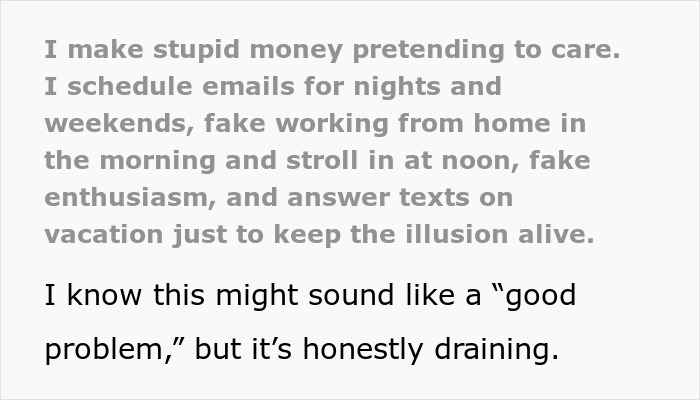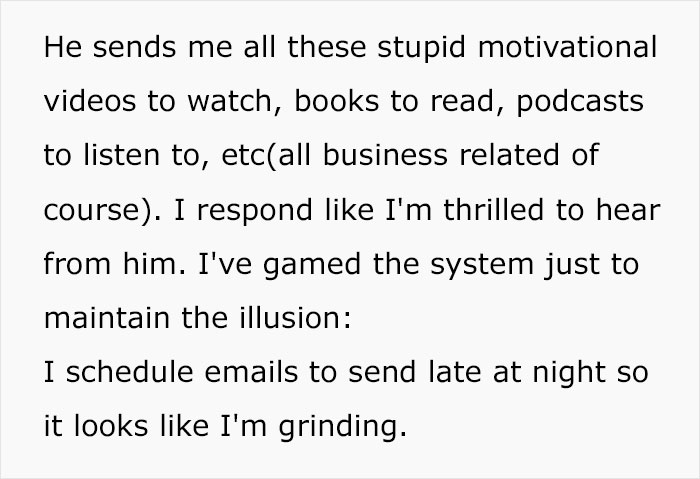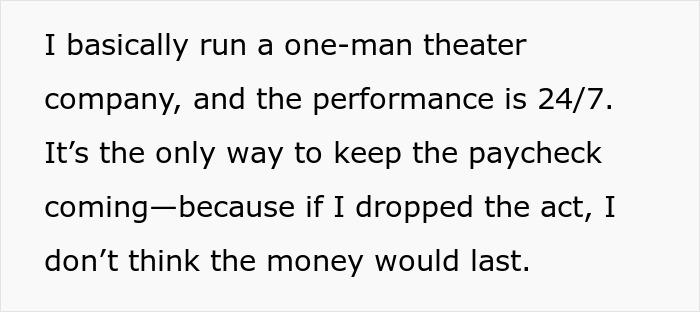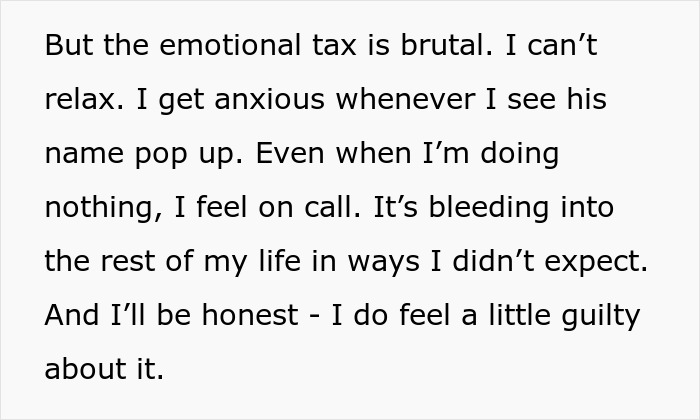It’s stated that when you do what you’re keen on, you’ll by no means work a day in your life. However as we’ve come to study, not everybody has the posh of touchdown their dream job. Some toil away doing issues they hate, like cleansing bathrooms. Simply to pay their payments and put meals on the desk. Others have managed to land high-paying gigs that bore the daylight out of them. They really feel caught and depressing however are hesitant to depart. As a result of… cash.
One worker shared how they make what they name “silly cash” whereas not doing a lot in any respect. The individual says they’ve been faking all of it alongside, pretending to be working 24/7, scheduling weekend emails, paying a freelancer to choose up their slack, and feigning enthusiasm. Whereas they’ve managed to trick the boss, the worker says the all-encompassing act is leaving them drained past restore. It’s opened up a dialogue about whether or not it’s actually price promoting your soul for six figures…
To the untrained eye, it will appear that this worker is continually working and is tremendous devoted to their job
Picture credit: charlesdeluvio / Unsplash (not the actual photo)
However it’s all a pretend present, and so they’ve confessed to “pretending to care” whereas really solely working about 5 hours per week
Picture credit: Francisco De Legarreta C. / Unsplash (not the actual photo)
Picture credit: Lyyfe Williams / Unsplash (not the actual photo)
Picture credit: MiddleSqueeze
A 2024 survey discovered that solely 18% of Individuals have been extraordinarily happy with their job
Total, job satisfaction in America is at one in every of its lowest factors in 16 years, according to a 2024 Gallup worker engagement survey. A mere 18% of staff polled stated they have been “extraordinarily happy” with their group. Being depressing at work impacts not solely the worker but in addition the corporate at giant.
I’m certain we are able to agree that it’s simpler to do a job you’re keen on. You’re much less prone to put your greatest foot ahead if you dread each weekday. Job satisfaction, due to this fact, results in higher total efficiency, notes efficiency administration platform 15five. The positioning provides that job satisfaction additionally results in higher worker engagement as a result of “staff who really feel they’re being rewarded justly for his or her work will probably be extra dedicated to the group’s objectives.”
When an organization has dissatisfied workforce members, there’s additionally the larger probability of pressure, arguments, complaints, and conflicts, which may affect the work that must be finished.
When there’s a excessive degree of job satisfaction inside a company, there’ll normally be decrease turnover. As a result of staff wish to be there. There’ll be larger productiveness. “An worker who doesn’t really feel happy at work is extra prone to do the naked minimal to get by as a substitute of going the additional mile,” explains 15five. “Glad staff get extra finished in much less time and push the entire group ahead.”
And naturally, the happier your staff, the extra seemingly they’re to sing your group’s praises. This could translate into free advertising, which in flip may also help recruitment efforts and even gross sales.
Job satisfaction has a sequence response. “When your staff are happy with the work they’re doing, that trickles down all the best way to the client,” notes 15five. “It doesn’t matter what you’re offering and the place these staff are within the provide chain, their work will have an effect on the top product and the way the client feels about it.”
Faking it at work is named “emotional labor,” and it’s really unhealthy on your psychological well being
Some dissatisfied staff will make it identified and look depressing each day. Others will “faux to care,” carrying a masks whereas faking it till their subsequent paycheck. A workforce of researchers name this pretend act “emotional labor.” Their definition is “managing feelings to meet the expectations of a job or social function, or pretending to really feel in another way than you really do.”
The researchers we’re referring to are Kash Afshar of the College of Mississippi and Omar Itani of Lebanese American College. They just lately got down to discover the emotional pressure on salespeople. And the way “emotional labor” can affect an worker’s psychological well being.
The workforce discovered that there are two sorts of “emotional labor.” One is what they name “deep performing.” This, they are saying, entails “a honest re-alignment of 1’s emotions to the feelings anticipated of them.” The opposite is “surface performing,” faking feelings with out inner alignment. In keeping with Afshar and Itani, floor performing poses extra of a menace to at least one’s well-being than deep performing.
“Managing feelings to fulfill job calls for can result in burnout and job dissatisfaction,” said Itani. “When staff are compelled to placed on a facade, it could actually hurt buyer interactions and total efficiency.”
He added that firms can and will do extra to advertise job satisfaction and psychological well-being. “A supportive workplace culture that encourages authenticity somewhat than forcing staff to ‘pretend it’ can enhance worker satisfaction and buyer relationships,” he stated.
Afshar and Itani aren’t the one ones to warn of the risks of faking it on the job. Monica Worline is a analysis scientist at Stanford College’s Middle for Compassion and Altruism Analysis and Schooling in California. She agrees that placing on a facade for cash can take a toll.
“Individuals who must pretend feelings at work burn out sooner,” cautioned Worline. She added that being compelled to behave as a substitute of exhibiting real feelings could make it simpler to fall into depression, expertise emotions of stress, or be sad with the job total.
Netizens got here to the feedback to share their 2 cents, and a few had no sympathy in any respect
Thanks! Take a look at the outcomes:


























